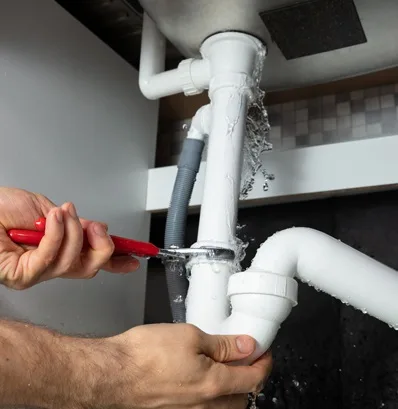In contemporary construction, advanced plumbing systems play a pivotal role in fortifying buildings with modernized functions and sustainable practices. The development of effective plumbing systems is a crucial detail that can significantly impact both the building’s functionality and the potential for sustainable use of resources.
Evolution of Plumbing in Construction
Plumbing has evolved significantly over the centuries—from rudimentary piping systems in ancient civilizations to innovative solutions mandating modern construction. These developments reflect society’s shifting needs and pressures, such as urbanization, burgeoning population, environmental concerns, and the quest for comfort and safety.
Features of Modern Plumbing Technology
Modern plumbing technology is a nexus of innovation, centered on augmenting energy efficiency, reducing water consumption, and promoting waste reduction. Forward-thinking concepts such as smart irrigation systems, water-recycling fixtures, and advanced detection of leaks form the backbone of modern plumbing solutions. These technologies aim to facilitate a better and safer water supply and promote optimal resource usage, all catering to the larger portfolio of sustainable development.
Sustainable Infrastructure: An Overview
The construction landscape is progressively adopting the ethos of environmentally-conscious infrastructure, essentially inculcating ‘green’ or ‘intelligent’ roll-out methods. This notion of sustainable infrastructure melds facets like roads, buildings, energy sources, and critically, water systems – this implies a clear intersection with plumbing solutions. A cornerstone objective of sustainable infrastructure, as pursued by FPG which specializes in plumbing, is to optimize the balance between catering to the basic service necessities of its consumer base and incorporating an environmentally-friendly approach in design, utilization, and maintenance of these systems.
Role of Plumbing in Sustainable Infrastructure
Plumbing serves as a central fulcrum in sustainable infrastructure, bearing multifaceted responsibilities. It guarantees water’s safe delivery for usage, facilitates optimal use of energy, ensures appropriate waste disposal, and minimizes impact on the environment. The role of plumbing significantly magnifies when viewed through the lens of ‘sustainability’, catalyzing changes that feed into the wider stream of development.
Water Efficiency in Modern Plumbing
In the quest to promote sustainability, water efficiency forms a significant cornerstone. Novel plumbing technologies such as tankless water heaters and low-flow fixtures result in substantial water savings. To cite a real-life example, Denver Water implemented an ambitious plan involving advanced plumbing to construct a high-performance administration building, representing the immense potential of innovation in water conservation.
Waste Reduction Practices in Plumbing
Modern plumbing techniques also play a significant role in waste reduction. Innovative technologies make it possible to treat and reuse wastewater, reducing the stress on freshwater resources. Sustainable urban drainage systems also help manage run-off and mitigate the risk of flooding, hence minimizing wastage and environmental impact.
Energy Conservation through Advanced Plumbing
Technological advancements enable advanced plumbing systems to contribute significantly to energy conservation. For instance, modern fittings like energy-efficient water heaters and ‘smart’ faucets help reduce energy usage, directly contributing to sustainability and cost savings.
Health and Safety in Modern Plumbing
The impact of sustainable plumbing reaches beyond the environment, also influencing public health. Modern plumbing reduces the risk of waterborne diseases by ensuring safe water supply and proper sanitation. Furthermore, automation in plumbing operations enhances safety by minimizing human errors and accidents.
Sustainable Materials in Advanced Plumbing
Sustainability also percolates to the choice of materials used in plumbing. Companies are exploring the use of materials such as recycled copper and other sustainable resources, signifying the sector’s commitment to reducing its carbon footprint.
Challenges in Implementing Advanced Plumbing
While advanced plumbing has numerous benefits, its adoption is not without challenges. These range from high initial costs, lack of skilled labor, governmental policy restrictions to resistance from end-users accustomed to traditional solutions.
Potential Solutions for Plumbing Challenges
To streamline the transition towards advanced plumbing, educating stakeholders about its long-term benefits, offering economic incentives, and formulating supportive policies are a few potential strategies.
The Future of Sustainable Plumbing
The plumbing industry awaits more green innovations as sustainability continues to steer its future. The sector is leaning into the exploration and development of more eco-friendly materials, low-impact installation methods, and energy-saving technologies.
Conclusion
Advanced plumbing plays a crucial role in modern architecture and sustainable living. Despite the challenges associated with its implementation, its distinct advantages make it a pivotal factor in moving towards a more sustainable future. As we continue to face the pressing issue of climate change, the importance of advanced plumbing is set to rise, offering a blueprint for better and more responsible infrastructure.
As sustainability gains prominence, innovative plumbing systems offer significant value by securing water supply, reducing waste, conserving energy, and lessening the environmental impact of buildings. Advanced plumbing, promoting the wise use of resources and functionality, is not just about technological and material improvement, but about the intention to blend with a sustainable future.

